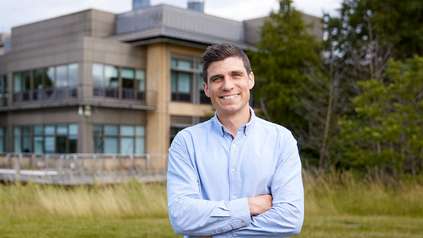Inigo Martincorena receives Dr Josef Steiner Cancer Research Award 2023
Dr Inigo Martincorena has received the prestigious Dr Josef Steiner Cancer Research Award 2023 for his pioneering research in understanding mutations in healthy tissues and their effect on the development of cancer.
The winner is chosen by the board of the Dr Josef Steiner Cancer Foundation, which consists of physiologists from the Universities of Bern, Geneva, and Zurich under the direction of the University of Bern.
This is the 23rd time this research prize has been given after being established by the Biel/Bienne pharmacist Dr Josef Steiner in the 1980s. This prestigious prize is awarded every second year for an outstanding and innovative cancer research project and comprises a research grant of 1 million Swiss francs and a personal award of 50,000 Swiss francs, the largest award of its kind focused on cancer research.
Inigo Martincorena graduated in Biology and Biochemistry at the University of Navarra, Spain, in 2007. In 2012, he obtained his PhD in evolutionary genomics at the University of Cambridge and EMBL-EBI, before moving to the Wellcome Sanger Institute for a postdoctoral fellowship. In 2016, he became group leader at the Institute, where he leads a team focusing on somatic mutation and evolution in healthy tissues.
Recently, Inigo and his collaborators developed a new sequencing method that makes it possible to study the types and frequency of somatic mutations of any tissue type. This includes non-invasive samples, such as buccal swabs, which can be easily collected from large numbers of people, enabling unprecedented studies of somatic mutations across many individuals.
The Dr Josef Steiner Cancer Research Prize will enable Inigo’s team to conduct a large study of over 1,000 people, studying how our lifestyle habits, genetics, exposures and disease history, influence the accumulation of cancer-causing mutations. This will allow them to investigate how different environmental and genetic factors influence the first stages of cancer development, and to explore new ways to predict and reduce the risk of cancer.
“Among the many outstanding applications for the 23rd Dr Josef Steiner Cancer Research Award, we selected Dr Martincorena’s project because his method makes it possible for the first time to systematically study the development of cancer-causing mutations in all organs. The award will support Dr Martincorena’s analysis of samples from large patient groupings. This should result in fundamental new insights into the factors that promote the development and spread of cells with cancer-causing mutations. This knowledge is the indispensable basis for the development of new strategies for cancer prevention.”
Professor Dr Stephan Rohr, president of the Foundation’s board from the Department of Physiology at the University of Bern
“I am honoured to be recognised with this award and very grateful to the Josef Steiner Foundation for supporting our future research. This award will allow us to expand our work on how the landscape of somatic mutation varies across individuals, and how this information could be used to understand and reduce cancer risk. Our work is a collective effort, and I am indebted to my team, my mentors, and my family, without whom none of this would be possible. I feel immensely privileged to be working in an exciting new field where the questions are big and so little is known, and to be sharing this journey with such wonderful colleagues.”
Dr Inigo Martincorena from the Wellcome Sanger Institute



